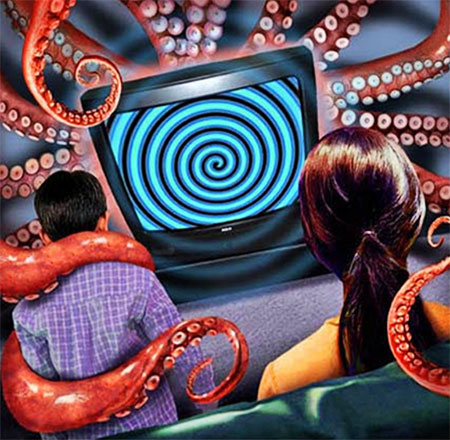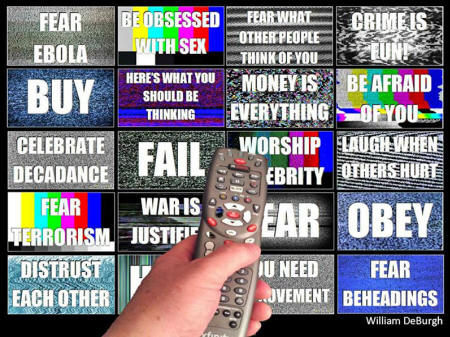|
from ActivistPost Website
Part 1 August 17, 2015
It might not be such a mystery when you find out how easy it is for TV programming - the waves it emits, the storytelling - to override basic brain function and even damage your body.
Reported earlier by Truthstream Media:
When scientists study these effects, we often find out later that they were only trying to help corporate advertisers better influence you.
They have even found that the brains of people watching movies together are snyced up! Is that a "syn" against individuality? Jerry Mander also discussed the damages of unbridled technology like television in "Questions We Should Have Asked About Technology." Even in the 1970s, he was arguing for the elimination of television.
One of his reasons was the "death culture" - all the story lines, especially in the news were heading toward death obsession.
Think about how that has changed in 40 years and what that does to already hopeless people? Is that entertainment?
Speaking of which, here is a video that shows how television affects your brain chemistry for the worst. Yes, the waves entrain your brain for the greatest suggestibility - but it gets worse. Your mind gets confused and derailed by the condensed and unrealistic story lines.
The imagery creates plenty of stress hormones - like the constant release of adrenaline - but with no outlet because we consciously try to tell ourselves that it's just a show.
Apparently, the brain and body disagree.
Does that explain how TV creates an artificial "high" and addiction?
The Plug-In Drug is a book that explains your brain on television and computers in greater detail.
Have you given up television? What were the results, good or bad?
September 02, 2015
A while back I wrote 'Part 1' (above) and someone asked,
No… the worst.
I don't mind getting called a Luddite or skittish about technology because I know TV's effects in my own life, large parts of which that were evaporated by a flickering, vampiric screen.
Such a blind trust in this "gift" to humanity really should have been questioned and cautioned early on.
The writer Jerry Mander even predicted the "death culture" of television in the 1970s when he analyzed programming for his book Four Arguments for the Elimination of Television.
He knew the magical, forceful will of manipulative imagery from the other side since he used those tricks as a top PR executive.
Last time, I touched on stress hormones. Volumes have been researched and written about hormones - the damaging effects of chronic streaming hormone release; but very rarely does anyone think to analyze that watching television might make up a good bulk of that stress.
So it would appear that chronic stress happens throughout the day while trying to work or survive, and then continues with entertainment - more like en-train-ment.
Maybe television should be considered in a dietary sense - something that is ingested and can be overdone.
Trauma can lead to brain fog and shrinking of the hippocampus - the brain center responsible for creating new, time-sequenced memories. Adrenal fatigue is the disorder du jour - could television play a role?
The body must not agree with the brain that the imagery is fake, because fight-or-flight is triggered just the same. Another aspect that people rarely mention is that storylines will trigger fight-or-flight adrenaline reaction based on events that happened in your own life.
Another word about adrenaline and nature. When rabbits are caught, either by traps or cornered by predators, naturally this activates their fight-or-flight. So, what happens when they are finally safe? They look cuckoo as they zip around in lightning fast circles in order to burn off the adrenaline rush.
What do humans do as their bodies flood with adrenaline? Nothing. Remain sedentary. Not even deep breaths.
Don't you think that is traumatic to the body?
Additionally,
I've only ever heard one doctor talk about it, and the only reason he thought to study the effect was because he stayed home with his child and noticed the sensory-overload and zipping nature of children's programming.
Last time, my article showcased a video clip about how television affects brain chemistry. The full video (below) discusses ways to break propaganda spells - aside from full abstinence, of course.
One of those ways is pointing out hidden placements and propaganda, such as overt product placements by companies who may have sponsored the show.
Side fact
Did you know that it's been admitted that "green" and globalist messages are worked into TV show scripts in order to hypnotize viewers into "going green" and saving the earth?
The WSJ article I just linked to may have gotten their information from an entire book on the subject, called Green Culture: An A-Z Guide - it's a textbook on sustainability and green society. In fact, this practice was rampant in the early 1990s.
Be sure that you are also aware of Big Pharma's four techniques to steal your trust through astro-turfing and media manipulation.
Are we really such brain-dead children that we need "morals" worked into our entertainment? Just whose morals are we downloading, anyway? Laughter through entertainment is a wonderful way to prompt a healing process, but it's also dreadfully used to gain acceptance of the unacceptable.
Scientists study YOU, not so that you can have better entertainment or health - but so that the companies that hire them can manipulate and sell to you better. What's the best way to break your will, they wonder.
But you are not a child and you don't need "story time" or the allowance of corporations to take rent-free space in your life.
Is it any surprise that Mexico's government is making sure that all the poor have digital TVs? That's well over a billion spent where I'm sure there's a more common sense and helpful use for those funds in Mexico.
I think one of the greatest tragedies in human history is how the globe got sucked into the videodrome.
Maybe that wouldn't even be so bad were it not for the fact that binge watching television is proven to make you more depressed and lonely!
Here is the full version of the footage above, "How TV Works":
Is there anything good about TV or movies?
Absolutely:
That's precisely the language of the subconscious - through metaphor and imagery!
For instance, the movie Invasion of the Body Snatchers could serve as a metaphor for so much social commentary - television is a body snatcher.
You may have used the movies Idiocracy and They Live to reach your friends in a conversation. On the other hand, violent or horror-inducing concepts can stick with us like an unwelcome house guest.
But it's a powerful language that bypasses conscious cognition. Which is all the more reason to guard your mind and heart.
It's time to start looking at television, not as some kind of reward, but with skepticism like a junk food or a pill. It's more powerful than the latter items because it doesn't just affect your health, but shapes who you are - it was designed that way.
Have you given up television?
What were the results, good or bad...?
|



